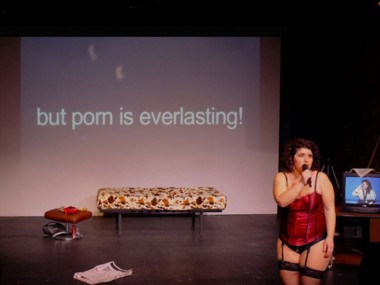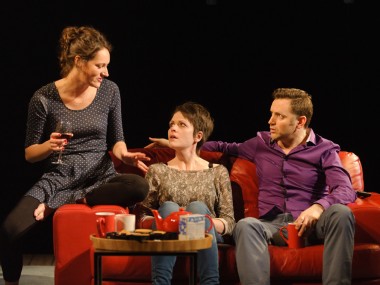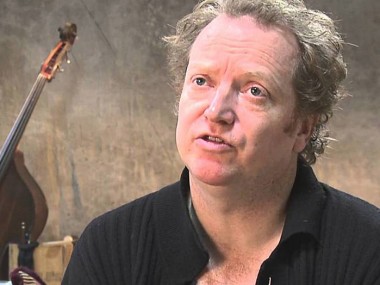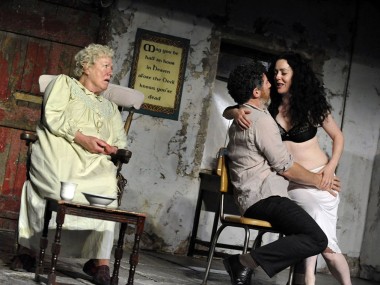We Want You To Watch, National Theatre
Friday 10th July 2015
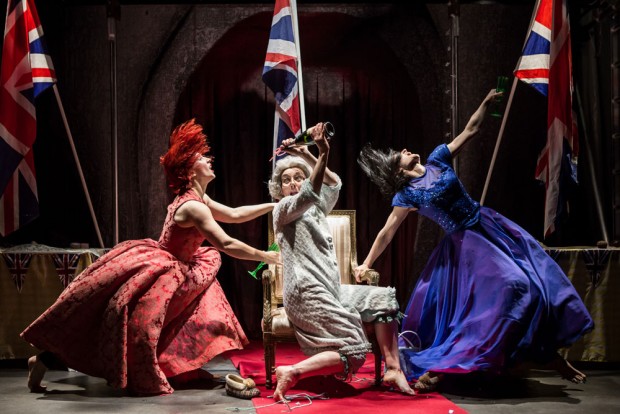
How can you write a good play about porn? Since everyone knows what it is, and how it looks, taking a literal approach is probably too simple and too self-defeating. Attacking porn for being, well porn, risks producing an example of political theatre that is hectoring and obvious. Best to have an oblique take on the subject. And that’s exactly what RashDash — a company founded by Abbi Greenland and Helen Goalen — have done with this provocative, and occasionally successfully disturbing, piece, which has been developed in collaboration with playwright Alice Birch.
With a running time of about 70 minutes, We Want You To Watch is a collection of sketches which illustrate a deliberately extreme argument: the theory is that all porn aspires to the condition of violent porn, and that violent porn creates violence against women. Therefore there is no such thing as harmless porn, or good porn. In fact, all porn should be banned. The Queen is head of state, and a woman, so the best way to ban porn is to petition Her Majesty. But, wait a minute, porn is most readily available on the internet so the internet has to be closed down — all of it. Finally, all boys watch porn so it’s best to shoot them before they grow into violent men. Better still, be nice to people, and enjoy the kindness of strangers.
You can see what I mean about this not being a literal show. Of course, some of the best satire thrives on exaggeration, on pushing ideas to their logical limit, so the general argument of the play could be described as refreshingly extreme. And the script is clear: we are not against sex; we just hate pornography. The trouble is that the sketches performed by RashDash, whose work features rawness, music and dance moves, are often clumsy, charmless and rather uneven.
In the first one, two women cops — played by Greenland and Goalen — beat up a male suspect because they believe that his addiction to violent online sex has led to the death and dismembering of a young woman. It’s a sketch which questions the stereotypes of vicious policemen and argues that disturbing sexual fantasy is almost the same as violent acts. When these women petition the Queen (played by Helena Lymbery) there’s a strong and memorable sequence in which they illustrate what watching porn feels like: brutish, hard, awkward, mindless, unlovely. A kind of repetitive banging. Then the Queen illustrates what, by contrast, sex feels like. It’s funny, frantic, delicate, sexy, ridiculous, intense, heartfelt. A soft, warm and firm unfolding. It’s the best illustration, actual and metaphorical, of a female orgasm that I’ve seen on stage.
But the rest of the show is a bit disappointing. There’s another metaphor — tins marked SEX — which suggests the commodification of desire, but its stage presence is weak. Performances, with help from Adam Charteris, Lloyd Everitt, Bettrys Jones and Peter Markinker, are often raw, but not always in a good way. There is a raucous atmosphere which can’t quite disguise the fact that the play feels oddly inconclusive and tentative, as if it didn’t quite believe in its own message. Like Blurred Lines, which was a devised feminist piece in the same studio space last year, this play can’t quite shake off a feeling that it is a student show.
Still, there are some moments that are enjoyable. Her Maj boogies to Beyoncé; the orange-suited master hacker who has the awesome power to close down the internet is a dominating tyrant; at the end, there’s a lovely episode of mercy as the cast help an old man, lost and burdened, to find his home. But the argument of the play finally feels superficial and lacking in nuance, while the staging — directed by Caroline Steinbeis and designed by Oliver Townsend — is too crude. Having said that, I’m in two minds about this show. Perhaps because I love its project, but not its execution. Good intentions are sadly not enough to make up for lack of content. As so often, the absurdism of the style means that the play’s ideas are perhaps too easy to dismiss. And that’s a real shame.
© Aleks Sierz

